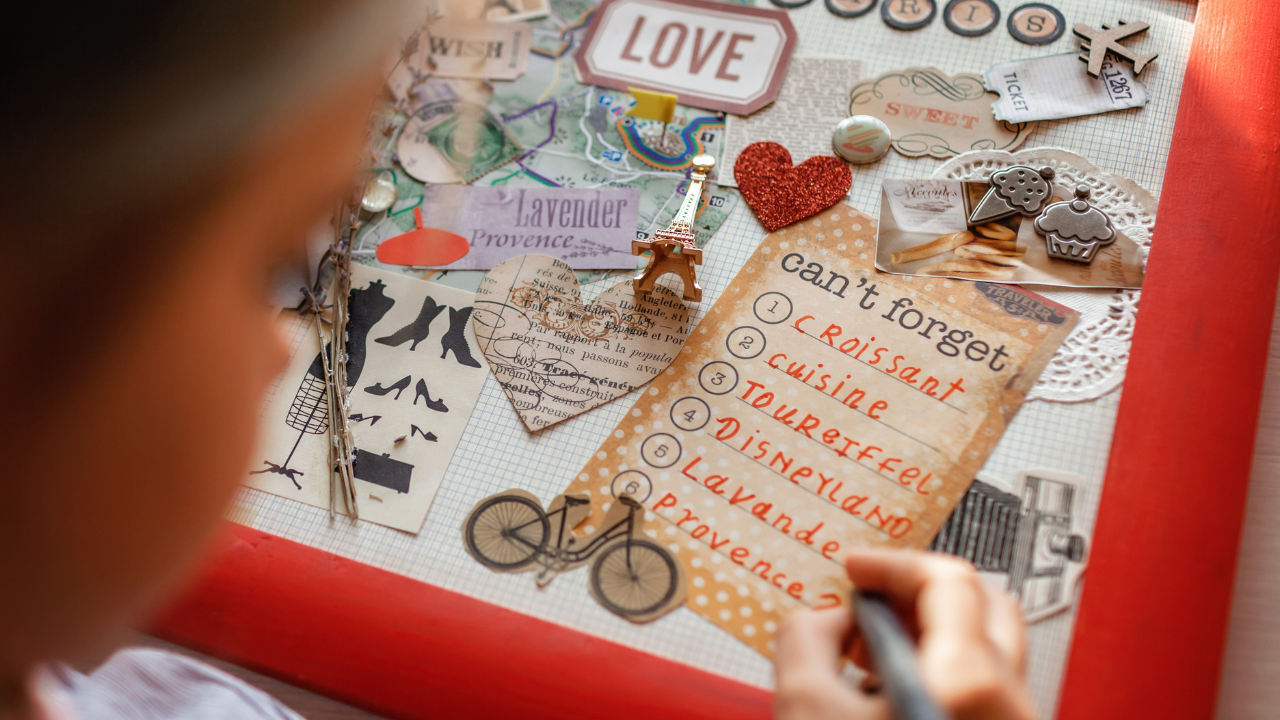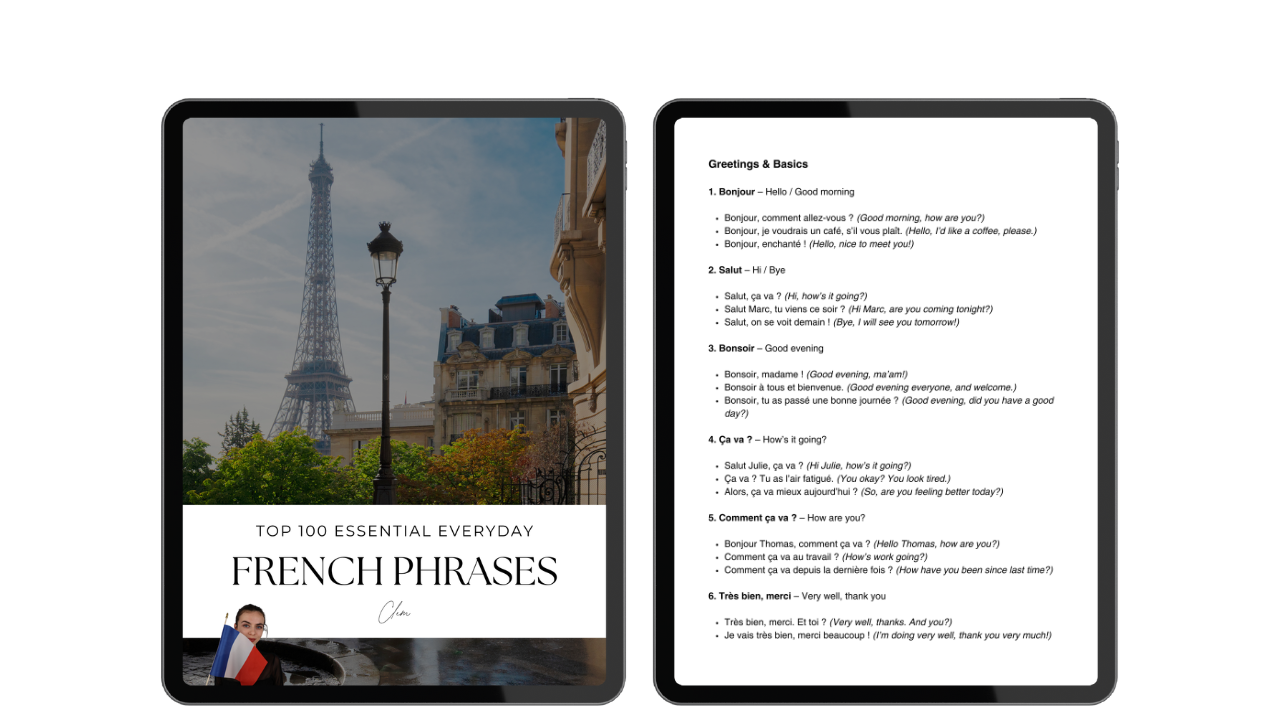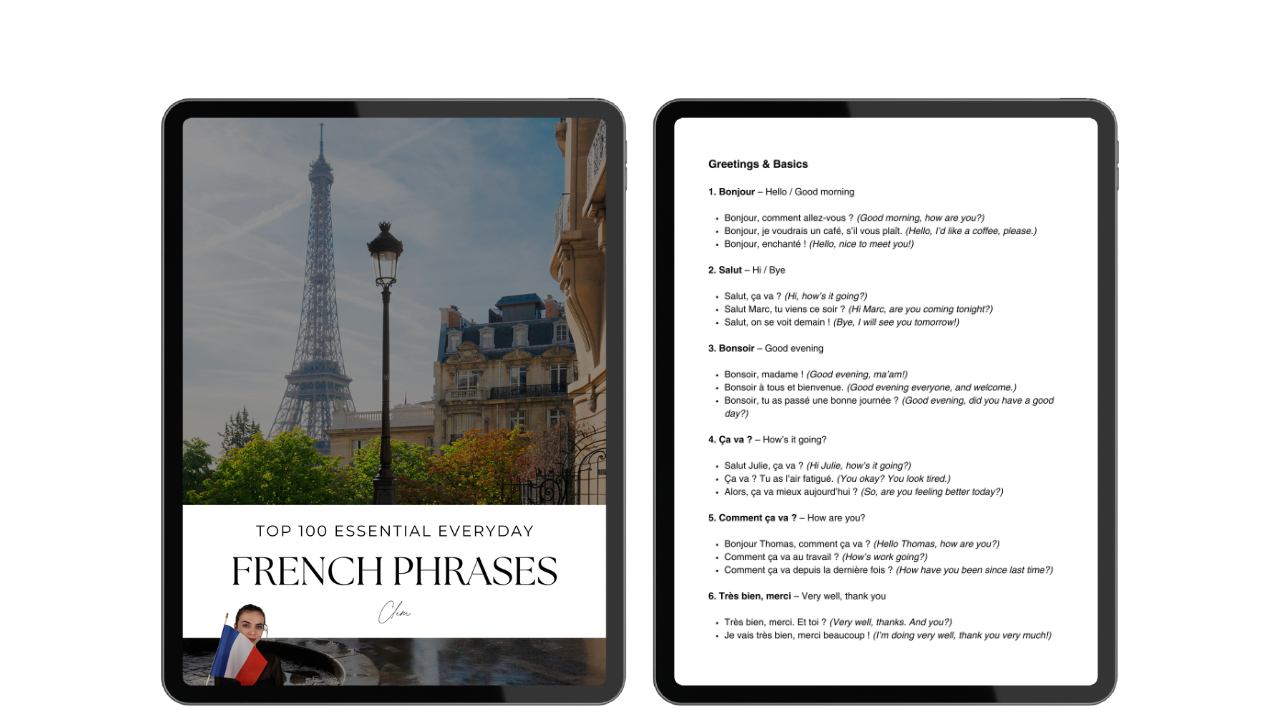
The 5 Verb Tenses French People Actually Use Every Day
Oct 12, 2025If you’ve cracked open a French grammar book, you’ve probably seen the terrifying verb tense chart—you know, the one that looks like it was designed to break your spirit.
It lists so many tenses: passé simple, plus‑que‑parfait, futur antérieur, conditionnel passé…
And you think:
👉 “Oh no. Do I have to learn ALL of these to speak French?”
Here’s the relief you’ve been waiting for: nope.
French does have a lot of tenses, but here’s the truth your textbook might not tell you: most French people only use a handful of them in daily life.
Yes, there are fancy, literary tenses—but they mostly live in novels, history books, and the occasional dramatic speech.
For everyday French—the French you actually hear on the streets, in cafés, and on Netflix—you really only need to focus on five main tenses.
Let’s break them down—what they are, why they matter, and how they sound in real life.
1. Présent (Present Tense)
Why it matters
This one’s obvious: the present tense is the foundation of everything.
If you only learned the present tense, you could still survive in France:
-
Order coffee (Je veux un café.)
-
Talk about yourself (Je suis fatigué.)
-
Ask questions (Tu parles anglais ?)
👉 It’s the tense you’ll hear and use the most.
How it works
The present tense is for things happening now—but also for general truths, habits, and even near-future plans.
-
Je mange. – I’m eating.
-
Je mange souvent ici. – I eat here often.
-
Je mange chez Paul ce soir. – I’m eating at Paul’s tonight. (Notice how English uses “I’m eating”—but French just says “Je mange.”)
👉 The present tense is more flexible in French than in English—you’ll use it for way more situations than just “right this second.”
Real-life French
-
On y va ? – Are we going?
-
Je suis en retard. – I’m late.
-
Ça marche. – That works.
Why it’s essential: If you skip the present tense, you can’t say anything. Learn it, love it, live in it.
2. Passé Composé (The “Daily Life” Past Tense)
Why it matters
If you want to talk about the past, this is the tense you’ll use 90% of the time in conversation.
Forget the passé simple (the fancy “literary past”)—that’s for novels and history books.
👉 In real life, passé composé is the go-to past tense.
How it works
The name sounds intimidating, but it’s just:
Avoir or être (in present tense) + past participle.
-
J’ai mangé. – I ate.
-
Je suis allé(e). – I went.
Easy enough, right?
Real-life French
-
J’ai vu Marie hier. – I saw Marie yesterday.
-
On a fait la fête ce week-end. – We partied this weekend.
-
Tu as regardé ce film ? – Did you watch that movie?
What makes it tricky
-
Some verbs use être instead of avoir (Je suis allé, not J’ai allé).
-
Past participles change slightly for agreement (but don’t panic—people get this wrong in real life all the time, and you’ll still be understood).
Why it’s essential: If you want to tell any story about yesterday, last weekend, or five minutes ago, this is the tense you need.
3. Imparfait (The “Background” Past Tense)
Why it matters
This is where French storytelling magic happens.
While passé composé is for specific events (“I watched a movie last night”), imparfait is for setting the scene or describing things in the past.
👉 Think: was-ing or used to in English.
How it works
Take the “nous” form of the verb in the present, drop the -ons, add endings:
-ais, -ais, -ait, -ions, -iez, -aient.
-
Je regardais. – I was watching / I used to watch.
Real-life French
-
Quand j’étais petit, je jouais dehors. – When I was little, I used to play outside.
-
Il pleuvait, on buvait du thé. – It was raining, we were drinking tea.
-
Tu faisais quoi ? – What were you doing?
The “combo” effect
In real life, imparfait often teams up with passé composé:
👉 Il pleuvait (imparfait) quand j’ai pris (passé composé) le taxi.
It was raining when I took the taxi.
Why it’s essential: If you want to tell stories like a French person—not just “this happened, then this happened”—you need imparfait.
4. Futur Proche (The “Easy” Future)
Why it matters
Technically, there’s a “futur simple” (I will eat, you will go).
But here’s the thing: in conversation, French people often use futur proche instead—it’s simpler, faster, and more common.
How it works
It’s just:
Aller (to go) + infinitive.
-
Je vais manger. – I’m going to eat.
-
On va sortir. – We’re going to go out.
👉 Exactly like “I’m going to…” in English.
Real-life French
-
On va voir ce film ? – Are we going to watch this movie?
-
Je vais t’appeler demain. – I’m going to call you tomorrow.
-
Ça va être génial. – It’s going to be great.
Why it’s essential: It’s the fastest way to talk about future plans. Yes, you can learn the futur simple later (and you should eventually), but for daily life? Futur proche does the job.
5. Conditionnel Présent (The “Politeness” & “What If” Tense)
Why it matters
This one sneaks up on you.
At first, you think the conditional tense is just for “would” sentences:
👉 “I would travel if I had money.”
But in French, conditionnel présent is also used for:
-
Politeness (“I would like a coffee” = polite “I want”)
-
Hypotheticals (“If I were rich, I would…”)
You hear it everywhere—even if you don’t realize it yet.
How it works
Take the futur simple stem + imparfait endings.
-
Je voudrais. – I would like.
-
On aimerait. – We would like.
Real-life French
-
Je voudrais un café, s’il vous plaît. – I’d like a coffee, please. (super common in cafés)
-
On pourrait se voir demain ? – Could we see each other tomorrow?
-
Ce serait bien. – That would be nice.
Why it’s essential: It’s the difference between sounding polite vs. demanding—and it’s key for talking about “what if” scenarios.
The Bonus Sixth Tense You’ll See (But Rarely Use)
Okay, I lied—sort of.
There is a sixth tense you’ll come across: passé simple.
You’ll see it in books, newspapers, historical articles:
👉 Il arriva. (He arrived.)
But here’s the thing:
👉 Nobody speaks like this in everyday life.
If you’re reading Les Misérables someday, you’ll need it. Until then? You can safely ignore it for conversations.
How These 5 Tenses Work Together
Here’s the best part: you don’t need to learn 14 different tenses before you can talk.
👉 These 5 are enough for almost everything you’ll say daily.
Example:
Present:
👉 On va au marché tous les samedis. – We go to the market every Saturday.
Passé composé:
👉 On a acheté du fromage hier. – We bought cheese yesterday.
Imparfait:
👉 Quand j’étais petit, on allait toujours au marché. – When I was little, we always went to the market.
Futur proche:
👉 On va acheter du vin demain. – We’re going to buy wine tomorrow.
Conditionnel présent:
👉 On achèterait du champagne si on avait plus d’argent. – We’d buy champagne if we had more money.
With just these, you can tell stories, make plans, and sound legitimately fluent.
Why Textbooks Overwhelm You With Tenses
Textbooks throw every tense at you because they have to “cover” the whole language.
But if you’re learning to speak French (not write a dissertation), you don’t need all that right away.
👉 Focus on the 5 everyday tenses first.
👉 Add the others later (subjonctif, plus‑que‑parfait, etc.)—once you actually feel comfortable.
How to Get Comfortable With These 5 Tenses
1. Live in the Present
Master the present tense early—it’s your anchor.
Listen for je suis, on fait, tu veux everywhere. Repeat them. Use them daily.
2. Tell Tiny Stories in the Past
Practice passé composé for “what I did yesterday.”
👉 “Hier, j’ai mangé une pizza.”
Then layer in imparfait for background.
👉 “Quand j’étais petit, je mangeais beaucoup de pizza.”
3. Talk About Your Plans
Use futur proche constantly.
👉 “Je vais faire les courses.”
👉 “On va regarder un film.”
4. Order Politely
Memorize je voudrais.
Say it at every café, every restaurant. It’s conditionnel présent in action.
5. Build Mini “If” Sentences
Use conditionnel to dream.
👉 “Si j’étais riche, je voyagerais.” (If I were rich, I’d travel.)
The Best News?
When you focus on these five tenses, you unlock real French conversations—the kind that happen in cafés, with friends, on the street.
👉 You don’t need futur antérieur to order a croissant.
👉 You don’t need plus‑que‑parfait to tell someone you went to the market.
You just need these five.
French has a reputation for being “complicated.” And yes, it has its moments. But when you strip away the tenses nobody really uses out loud, you’re left with something manageable—and surprisingly simple.
👉 Présent for what’s happening now.
👉 Passé composé for what happened.
👉 Imparfait for background and stories.
👉 Futur proche for what’s coming.
👉 Conditionnel présent for politeness and “what ifs.”
That’s it.
Master these, and you’ll sound more natural, more fluent, and way more confident than you think.
Because here’s the truth:
French isn’t about knowing every tense on the chart—it’s about knowing the ones real people actually use.












